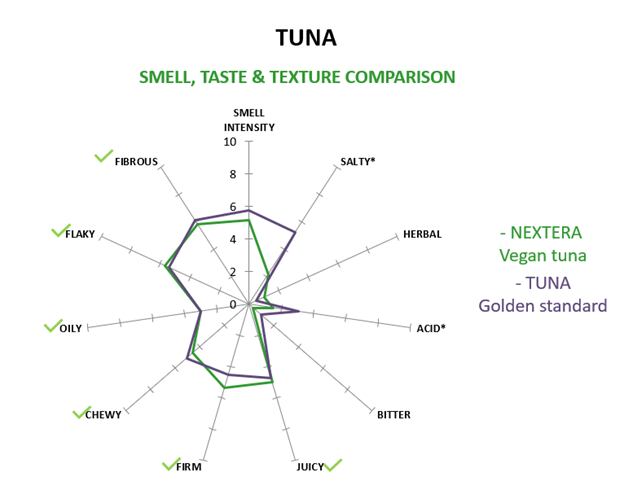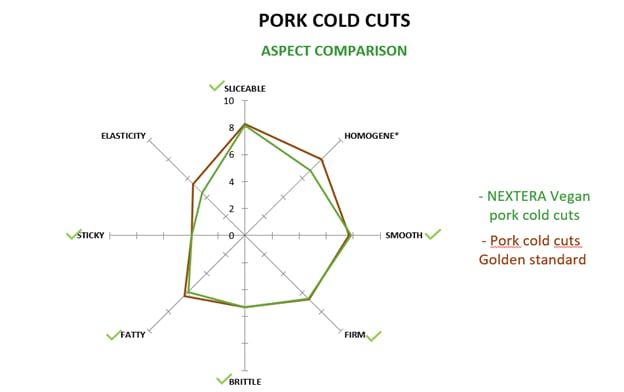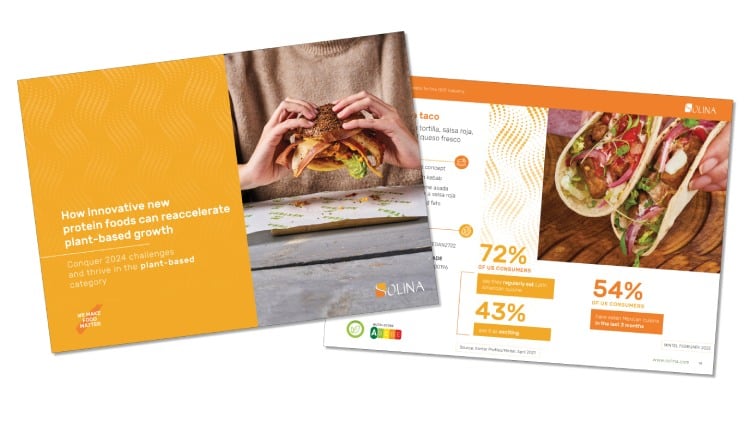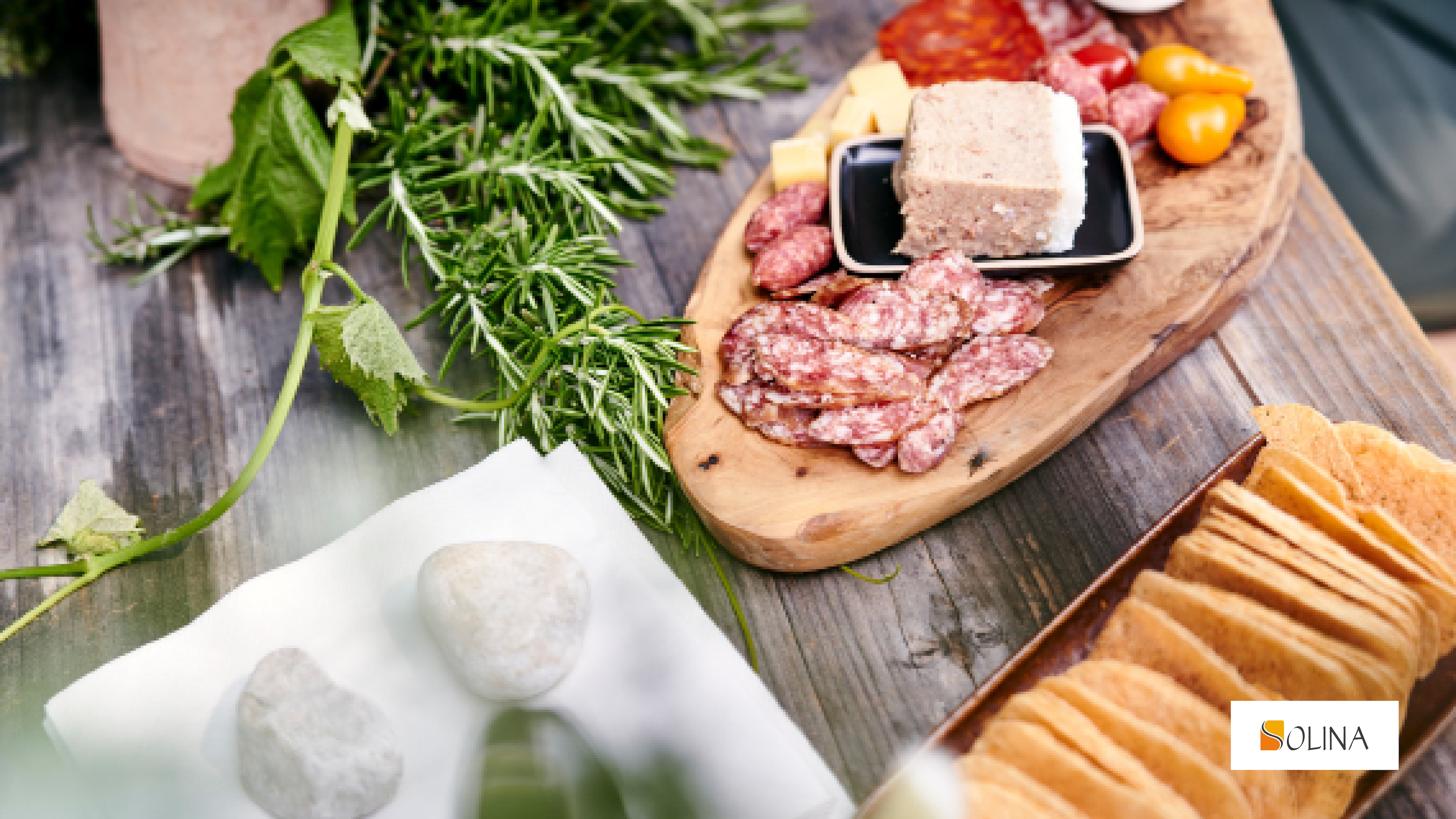To persuade more people to switch to plant-based alternatives, manufacturers will need to address one of the top barriers to uptake: the sensory experience.
Closing the sensory gap is critical to the continued growth of new protein foods. Plant-based proteins are now established in the weekly diets of many vegans, vegetarians and flexitarians but are yet to replace meat and fish in the diets of most consumers. In 2022, sales of plant-based meat in 13 European countries hit €2 billion but accounted for just 6% of the overall pre-packaged meat market.1
If manufacturers are to increase penetration and maintain double-digit growth, they will need to convert consumers who will only buy plant-based foods if they match the sensory experience of animal proteins. A poll of 7,590 people in 10 European countries found “the expectation that plant-based food products would not be tasty enough” and “the experience of not enjoying such products” were two of the top barriers to consumption of new protein foods.2
Continued concerns about the taste and texture of new protein foods explains why plant-based meat accounts for 6% of the wider market at a time when most Europeans say meat consumption needs to fall and many people want to change their diets.3
The data suggest there is pent-up demand for new protein foods. Millions of Europeans want to switch to plant-based foods but are unwilling to compromise on the sensory experience. Now, manufacturers can make products that serve the pent-up demand, as a recent vegan food taste test shows: the sensory analysis of food by 12 trained panellists found multiple vegan products match the animal protein gold standard.
Vegan tuna
The panellists compared NEXTERA® by Solina’s vegan tuna to the leading European plant-based products and the animal protein gold standard. Compared to existing plant-based tunas, the NEXTERA® by Solina solution ranked higher on flakiness and chewiness — key attributes for tuna — while being less bitter and acidic. The panellists also found the solution to be less salty, reflecting NEXTERA® by Solina’s use of seasonal elements, rather than salt, to balance the taste of the plant-based protein.
Comparing NEXTERA® by Solina’s plant-based tuna to the gold standard animal protein, the panellists said the products had similar fibrosity, flakiness, oiliness, chewiness, firmness and juiciness. The lack of significant differences between multiple attributes of the plant-based and animal tunas suggests that the NEXTERA® by Solina solution can address the demand for sensorially optimised new protein foods.

The solution is the first-ever canned tuna with real vegan flakes and sensorial parity with the gold standard. NEXTERA® by Solina’s multi-disciplinary team of application technologists, engineers, scientists, dieticians, culinary chefs and more used their expertise, combined with a state-of-the-art dedicated New Protein Food Research Centre in Belgium, to create a plant-based product with a distinct fibrous texture and an authentic tuna flavour. The solution is high in protein and low in saturated fats, giving it a Nutri-score of A and making it the perfect snack for the health-conscious consumer and a good fit for use in salads, sandwiches, pizza and spreads.
Download the full vegan tuna report here.
Vegan pork cold cuts
The second assessment compared NEXTERA® by Solina’s vegan pork cold cuts to existing plant-based options and the animal protein gold standard. Again, the vegan pork cold cuts performed better than the other plant-based products across a range of sensory measures such as “fatty” and “firm”.
As importantly, the panellists found the vegan pork cold cuts were indistinguishable from the leading animal protein product in terms of smoothness, firmness, brittleness, fattiness and stickiness. The vegan pork also matched the animal protein with regards to how sliceable the panellists found it to be.

The results are testament to the effectiveness of NEXTERA® by Solina’s approach. To develop the vegan pork cold cuts, the company performed a comprehensive sensory evaluation of all available products in the market, assigning scores based on their respective attributes. The scores informed the development of a solution that performed better than its competitors across key sensory attributes.
Through the process, NEXTERA® by Solina has delivered an allergen-free vegan cold cut with the savoury taste that consumers associate with pork products. The vegan cold cut is pre-cooked and ready for use in salads, on bread and as a snack. With a Nutri-score of B, compared to D for the gold standard, the vegan cold cut is the healthier option.
Download the full vegan pork cold cuts report here.
Vegan salmon fingers
The third product assessed in the food sensory panel is breaking new ground. Because no comparable plant-based options were available, the panellists only compared NEXTERA® by Solina’s vegan salmon fingers to the gold standard animal protein product.
NEXTERA® by Solina’s solution performed comparably to the gold standard in terms of smell intensity, salmon taste, crunchiness, firmness, juiciness, fattiness and chewiness. The panellist’s conclusions show the plant-based salmon solution can form the basis of a tasty vegan fish finger or burger and unlock a new market for manufacturers. The solution is high in protein and fibre, low in saturated fats, has a Nutri-score of A and is free from antibiotics and microplastics.
Those factors, coupled with the unique blend of flavours and textures, make the plant-based salmon an ideal option for consumers who prioritise both health and taste in their dietary choices. Food manufacturers can package the plant-based protein as a finger, coated burger, ball or croquette to create a range of products that are easy to prepare and free from the bones that put some people off fish.
The plant-based salmon is suitable for cooking in the oven, pan frying and deep frying. While the animal gold standard cannot be deep fried, the lower fat content of the vegan alternative unlocks that cooking method and makes the plant-based protein ideal for Quick Service Restaurants and home consumption.
Download the full vegan salmon fingers report here.
Conclusion
The sensory panel reveals the opportunities that are now available to every plant-based food company and that NEXTERA® by Solina has closed the gap between the taste and texture of new protein foods and the gold standard animal proteins. While vegan and vegetarian food manufacturers were previously limited to niche markets, they now have access to solutions with the desirable sensory attributes needed to persuade omnivores to switch to new protein foods. As companies bring foods to market and secure repeat sales, they will accelerate the plant-based transition.
Solina’s pilot plant enables its teams of scientists, technologists, engineers, chefs and dieticians to quickly optimise the taste and texture of new protein foods. NEXTERA® by Solina’s development of best-in-class products is facilitated by a unique business model that gives its teams the independence to source the right raw materials and technologies for each project, supported by customisation options that include great-tasting vegan sauces.
NEXTERA® by Solina is fuelling the acceleration of plant-based eating. In 2022, the company’s previous sensory panel found its vegan chicken-like nuggets and fish-like fingers outperformed the leading plant-based products on all of the main sensory attributes. Notably, the vegan nuggets matched the McDonald's chicken gold standard against a range of key criteria including crispiness, firmness, oily texture, juiciness and chewiness. Across the two sensory panels, NEXTERA® by Solina has validated the effectiveness of its unique model.
Paired with deep savoury food knowhow, NEXTERA® by Solina’s concept-to-launch approach is enabling the creation of new protein foods that match the sensory attributes of animal proteins. This in turn helps to improve on their nutritional properties to clear the remaining barriers to the adoption of plant-based products.
Explore Solina’s New Protein Food page and learn more about creating plant-based solutions informed by the latest trends in consumption on Solina.com/Nextera.
References
1. Williams, A. Plant-based food sales boast 22% growth since 2020. GFI Europe https://gfieurope.org/blog/plant-based-sales-in-europe-22-growth/ (2023).
2. Perez-Cueto, F. J. A. et al. How barriers towards plant-based food consumption differ according to dietary lifestyle: Findings from a consumer survey in 10 EU countries. International Journal of Gastronomy and Food Science 29, 100587 (2022).
3. Astley, C. Most consumers in western Europe want alternatives to conventional meat, survey shows. GFI Europe https://gfieurope.org/blog/most-consumers-in-western-europe-want-alternatives-to-conventional-meat-survey-shows/ (2022).








